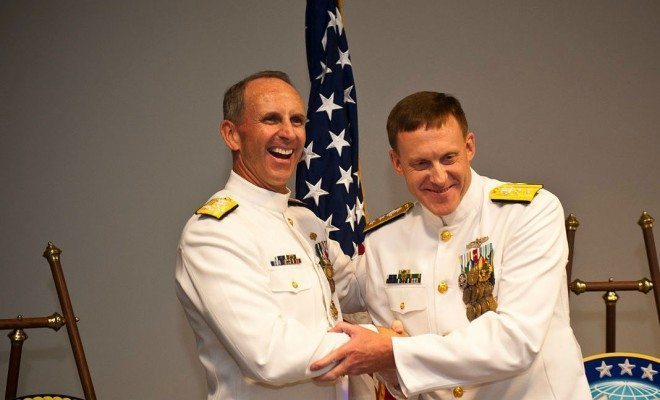
Blogs
Just Who Is Our Next NSA Chief?
On Thursday, January 20, 2014, President Obama nominated Vice Admiral Michael S. Rogers to replace General Keith Alexander to be the new Chief of the National Security Agency (NSA). The NSA has been buffeted by controversy after controversy due to the documents leaked by Edward Snowden. Considering all of the new allegations coming to light on a continual basis, it is important to ask how Michael Rogers, if confirmed by the Senate, can change the NSA — and if he can change it for the better.
Vice Admiral Rogers is a decorated, longtime member of the armed forces, specializing in cryptology in the Navy shortly after graduating Auburn University in 1981. Beginning in 2003, Rogers served the Joint Chiefs of Staff for the Iraq War as part of the Joint Staff, the advisory team tasked with analyzing current and future strategies in warfare, including the network defense capabilities overseen by Rogers himself. The Vice Admiral has had a smooth career progression since that stint, shooting up to Director of Intelligence for Pacific Command in 2007, Director of Intelligence for the Joint Chiefs of Staff in 2009, and finally becoming the first-ever commander, U.S. Fleet Cyber Command.
Rogers’ Senate confirmation most likely will take another month, and citing a tradition barring any media interviews until after confirmation, it is unlikely that average Americans will get to know their future NSA Chief ahead of that. He is most likely going to be asked about his operations in Cyber Command, as that agencies, as well as the NSA, are pertinent to national cybersecurity. President Obama, ignoring recommendations from an NSA advisory panel and Director of Intelligence James Clapper, Jr., has decided to keep the NSA and Cyber Command leadership posts under the same roof.
Yet, now that we know Vice Admiral Rogers is an exemplary officer, the question arises whether he’ll be looking to safeguard Americans’ privacy in this new digital age. The Snowden documents have outlined numerous programs designed to collect bulk data from Americans every day, and there is a new public shift in opinion toward reigning in these programs. According to an Associated Press/GfK poll released January 27, 60 percent of respondents reported valuing privacy over terrorism concerns regarding NSA activities. In a statement following Rogers’ nomination, Secretary of Defense Chuck Hagel said, “I am…confident that Adm. Rogers has the wisdom to help balance the demands of security, privacy, and liberty in our digital age.” Confidence in Rogers would be appropriate considering his admirable service to our country, but it remains to be seen how Rogers will deal with the politics that come along with the country’s concerns over domestic surveillance programs.
One issue to ponder during Rogers’ confirmation hearings include possible clemency for Edward Snowden, as interest in this topic has picked up in recent weeks. A Washington Post-ABC News poll shows that the majority of Americans think Snowden should be charged with committing a crime, as opposed to allowing full clemency (52-38%). Reconciling this information with editorial boards, such as the New York Times, calling for forgiveness for the former systems administrator, will be tough, indeed. Rogers will have to work with the NSA’s new privacy advocate, Rebecca Richards, in order to properly safeguard Americans’ privacy rights. On top of these new responsibilities of the newest NSA leader, there are reports that privacy advocates aren’t too sure of the President’s nominee. This is natural, considering Rogers’ extensive experience within the nation’s armed forces.
President Obama introduced new reforms into the government’s phone metadata collection program, one of the first operations revealed by the Snowden leaks through the Guardian and the Washington Post. It is not clear as of now how Vice Admiral Rogers will handle changes such as acquiring a warrant before searching the metadata database; tracking individuals two steps removed from a suspected terrorist as opposed to the former three steps; and deciding where the metadata information will be stored. The pressure’s on for the experienced cryptologist, as there are conflicting court decisions over the legality of the phone surveillance program, as well as a federal commission voting 3-2 that the metadata practices are unconstitutional.
Whether one thinks that the National Security Agency programs are constitutional or illegal, it will take some time for there to be a consensus within the federal court system — most likely to be determined by the Supreme Court. In the meantime, it’ll be important to see how Vice Admiral Rogers answers the questions at his upcoming Senate confirmation hearings. This will be the key to how America’s spy programs will be run for the time being.
—
Dennis Futoryan (@dfutoryan) is an undergrad with an eye on a bright future in the federal government. Living in New York, he seeks to understand how to solve the problematic issues plaguing Gothamites, as well as educating the youngest generations on the most important issues of the day.
Featured image courtesy of [U.S. Navy photo by Mass Communication Specialist 1st Class Joshua J. Rogers via Wikipedia]








Comments